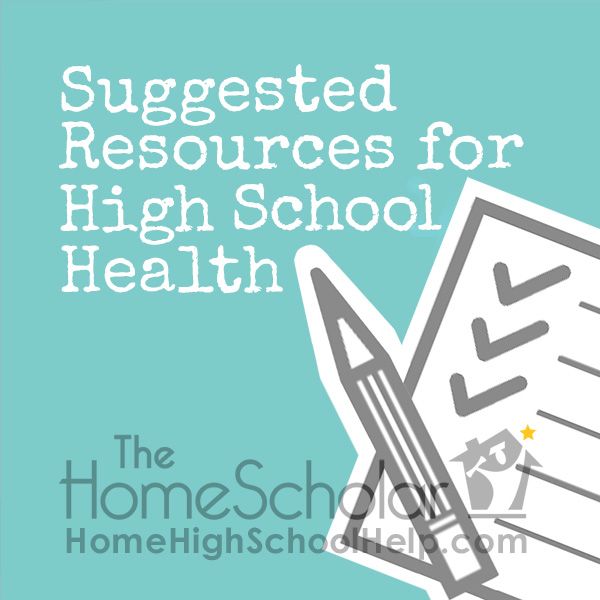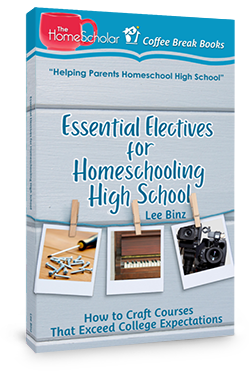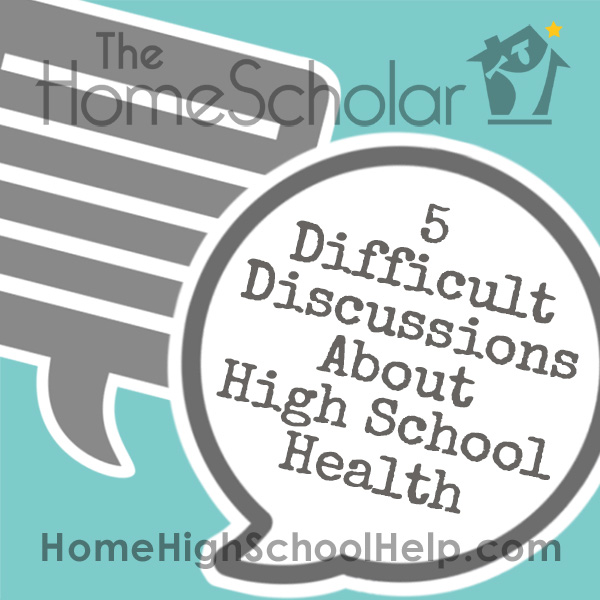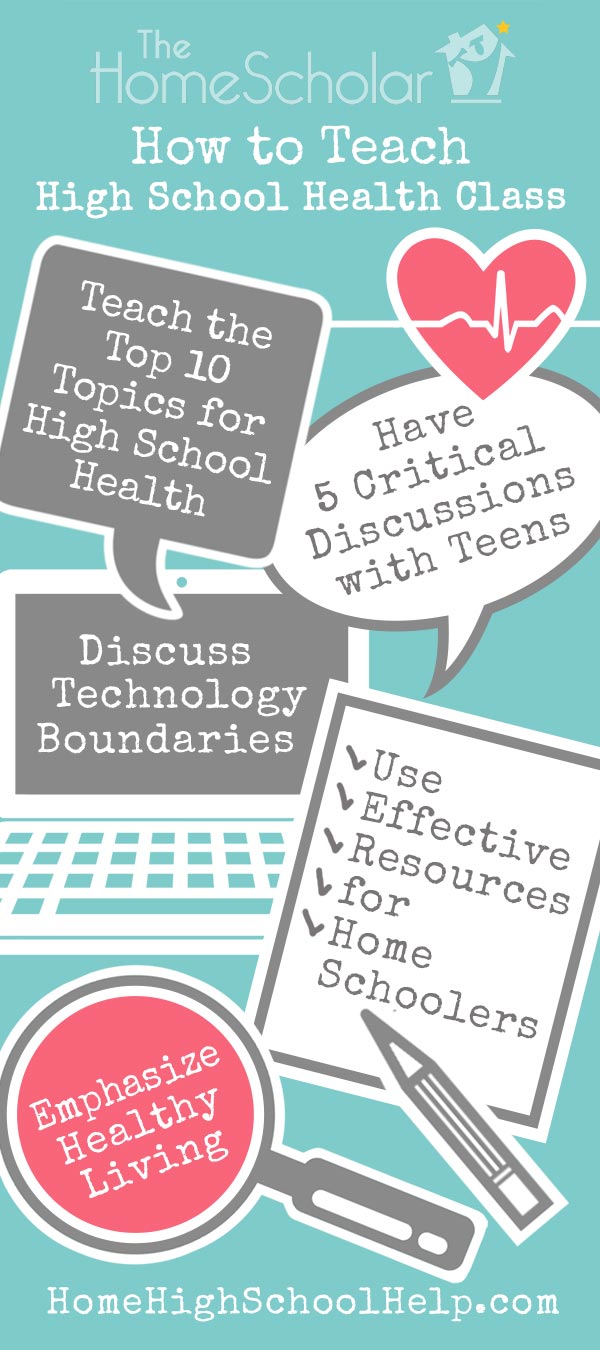Homeschool Health for High School: How to Create Healthy Teens
Before I started homeschooling, I worked in a hospital as a nurse. I was sometimes shocked at the ignorance people displayed about their own body and how they ignored life-threatening situations and symptoms, as if avoiding a problem would make it go away.
Sometimes parents hope they can avoid common high school health problems by ignoring the topic. But I know something about homeschoolers; we have the advantage when teaching our students homeschool health.
Parents don’t teach homeschool health because it’s required; they teach it because they love their children. Homeschool parents want healthy teenagers. They also want their children to remain healthy after they grow up. Teaching homeschool health in high school is the key to this important outcome.
Your goal is to successfully launch your child into a happy and healthy adulthood. To achieve that goal, your child must learn how to live a healthy lifestyle.
Let’s spend a few minutes learning how to get this done. How do you teach high school health and put it on the homeschool transcript?
Colleges don't require a health credit for college admission but it's
common for states to require health for high school graduation. Check to make sure you are complying with your state
homeschool law. Remember, you don’t have to meet public school law, so
you can avoid some of the more off-putting parts of high school health
taught in public schools. I haven't seen a state that requires a
specific topic for a homeschool health class.
Provide a semester or year-long
class called “Health.” Homeschool health is often a half-credit class. A
half-credit means your child has spent 60 to 90 hours learning about
health. If the child has spent 120 to 180 hours, then you can give one
credit for the class. You can teach health class over a number of years
before you award one credit or a half credit for the class.
Homeschool health
classes earned through natural learning are possible. If you need to
cover health in your state, you may find it’s a subject you have covered
naturally through normal parent-child discussion and interaction, or
through books you have read together as a family.
Note: This post contains affiliate links. If you click and buy, I make a few pennies, but sadly, not enough for a latte.

Top 10 Topics for High School Health Class
These are the top 10 most important health topics to cover in high school. Within these suggestions, there is plenty of room to individualize this list for your student and family.
- Alcohol, examples of alcohol, and negative consequences of alcohol
- Discussions of physical, mental, social, and emotional health
- Drugs, examples of drugs, and negative consequences of drugs
- First aid, CPR, emergency preparedness, and personal safety
- Health maintenance and common health diseases
- Healthy and balanced technology use
- Healthy eating, nutrition, and body image
- Healthy living and exercise
- Sexual education, reproduction, and relationships
- Tobacco, tobacco products, and negative consequences of tobacco and vaping
5 Critical Discussions about Health When Homeschooling High School
1. Discuss Relationships
In our homeschool, we studied interpersonal relationships by reading books on dating. Each book has a unique perspective on dating, so make sure you read each synopsis carefully to be sure they match your family values. The ultimate final exam is your child’s ability to establish and maintain healthy relationships.
- During early adolescence, we used Passport 2 Purity Weekend Retreat Kit by Rainey.
- We also read Boundaries in Dating by Dr. Henry Cloud. There is a coordinating guidebook and audio CD available.
- More ideas in this Relationship and Purity Studies Book List.
2. Talk about Pot and Alcohol
Now that recreational marijuana use is legal in many states, it has become equivalent to alcohol. Consider a unit study approach as topics come up in the news. Discuss the use of marijuana and its effects on society. Start the discussion where it affects teens the most (cost and driving under the influence). Discuss the medical use of marijuana and the effects of marijuana and alcohol. Then, get into detailed information using health reports and covering the economics of the drug industry.
Provide your teen with the facts so they know what's true when they read reports and studies. I handled topics like this by printing articles for my teen to read and then we discussed each topic over lunch.

3. Discuss Technology Boundaries
Technology boundaries is a critical homeschool health topic. Do a unit study on technology use and abuse. My free 6-hour class on Critical Technology Boundaries for Teens will help you guide the conversation. The class is intended for adults, not children, but you can use the resources provided to discuss it with your teen.
I also wrote a book on the topic, which includes expert interviews from parents, counselors, and homeschool families on the front lines dealing with technology addictions. With the prevalence of the internet and smartphones, the age of first exposure to pornography is younger than 11 years old, so it’s important to provide information about technology to counter the culture. This eye-opening book offers hope for parents battling the technology monster. Learn how to deal with the harsh reality of technology and addiction, and how to set boundaries for healthy and happy children and teens. Read TechnoLogic: How to Set Logical Technology Boundaries and Stop the Zombie Apocalypse.
4. Study the Importance of Sleep
It's important to teach your child about the importance of sleep. Lack of sleep affects success in high school. The issue becomes larger and more serious as they grow older and go to college. Teaching your child about sleep early on can help. I suggest assigning your child a paper about the importance of sleep, perhaps even once a year. Hopefully, by the time they graduate high school they will understand the necessity of sufficient sleep. It can help them succeed once they get into college, so it is an important life skill.
One of the biggest problems facing freshmen in college is lack of sleep. In college, your child will experience all-nighters and fun times. Make sure they understand the importance and value of sleep before they face those challenges.
5. Talk about Drugs
Homeschoolers are not immune from parenting woes the rest of society is facing. Our children live in the real world, no matter how much we love and shelter them. And in the real world, drug overdoses are increasing, with deaths from drug use surging.
As a registered nurse, I've seen wonderful parents suffer consequences when they ignored their children’s problems. Wishful thinking and gallons of prayer can't prevent humans from making bad choices. Kids can still make their own decisions. Good homeschool parents can have a child who makes poor life choices, so don’t beat yourself up if it happens to you!
Look for the 59 Warning Signs of Drug Abuse Parents Need to Know.
Understand what to look for, observe your child intentionally, without discounting the possibility of drug use. Ask open-ended questions and start a conversation. This is hard, but important. Seek help if needed, starting with your pediatrician. Even perfect parents can't guarantee that a child will always make good choices. Instead, starting now, open your eyes. Make changes if you identify a problem.

Health Curriculum Options for Homeschool High School Health
As a Christian and a registered nurse, my perspective may not be the same as yours. I can show you the curriculum we successfully used, but research each item to make sure they match your needs and values. Check recent reviews and updated versions, which may change significantly over time (for better or worse).
We used health books by Susan Boe. Written for Christian schools, these textbooks assume the student lives in a reasonably healthy environment at home. They cover physical, spiritual, and social health. You don’t have to use the school portions of the book to teach health at home. My children simply read the student textbooks. We didn’t use tests, study guides, or quizzes. There are two books in the series, both from a Christian perspective:
- Total Health: Choices for a Winning Lifestyle for High School by Susan Boe - available at Christianbook.com
- Total Health: Talking About Life’s Chances for Middle School by Susan Boe - available at Christianbook.com
Check out these other health curriculum options popular with homeschoolers to find a good fit:
- Exploring Creation with Health and Nutrition by Laura Chase (of Apologia) – available at Amazon
- Exploring Creation with Health and Nutrition Course Set – available at Christianbook.com
- Abeka Health in Christian Perspective
- Lifepac Electives: Health, Complete Set by Alpha Omega
Emphasize Healthy Living for a Lifetime
Beyond textbooks, you can teach health naturally, through healthy living. We prioritized physical fitness through sports team participation. Group sports require at least modestly healthy living, with a balance of sleep, nutrition, and exercise.
Following your student’s interest is great but beware that overinvolvement in sports can increase life stress, which may lead to a less healthy lifestyle. If you are considering select sports, varsity sports, or competitive teams, make sure it’s what your teenager wants, and not merely what you want.
There are other ways to facilitate competitive physical fitness that do not rely on sports teams. Look into the Presidential Council on Physical Fitness. The Congressional Award program emphasizes physical fitness and can be motivating for kids who aren’t into team sports. Many children rely on Scouting for physical fitness. Colleges love to see “Eagle Scout” on an activity list! If your child loves scouting, it’s a great way to encourage a lifetime of good health.
Keep an Open Dialog on High School Health Issues
Keep dialog open and commit to frequent, encouraging discussions. Shutting down a conversation with threats or Bible verses will not be as helpful as talking through each issue calmly. As your child grows and develops friendships outside the home, they will be exposed to other views from friends and coworkers.
Even Christian teens should be able to explain healthy relationships from a secular as well as faith-based, scripturally-sound perspective. In the future, your teen or their friends may rely on that secular reasoning as they make choices. Your children may go through a rebellious season and reject Biblical reasoning. Providing general information on healthy relationships can cover many seasons and unexpected happenings. Discuss personal safety issues, clues to abusive relationships, and cohabitation.
Homeschool Health Class Final Exam
Recommended Resources

Ideas and Lists for:
Curriculum for Core Classes and Electives
The HomeScholar's Best Selling Books
Fun and Games Across the Curriculum
Your Student's College Packing List
The HomeScholar's Coffee Break Books
Test Preparation Help
Books for College Bound and Middle School
Some of Lee's Favorite Home and Travel Items

Learn How Homeschool Electives Can Make Teens, Parents, and Colleges Happy!
Homeschool electives are fun! Teens love them because electives involve a lot of what they want to do anyway. Parents love them because a happy teen makes for a happy family! Colleges love them because it helps them understand your teen so they can make good admission and scholarship decisions.

If you are a beginner at homeschooling high school, consider the High School Solution, which provides detailed training on homeschooling, from middle school through senior year. Get complete instruction for choosing curriculum, encouraging delight directed learning, and teaching advanced subjects through training classes for parents, all with handouts or workbooks plus articles and templates.

 Login
Login





